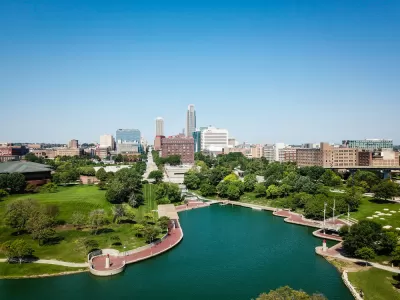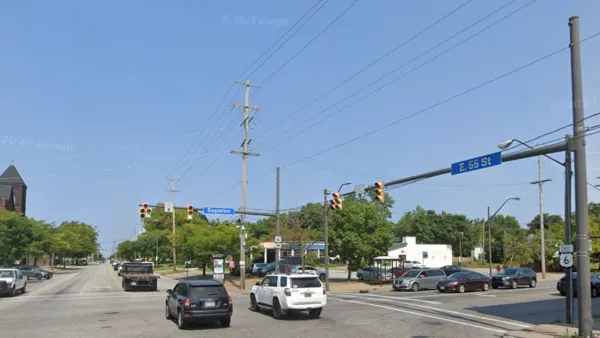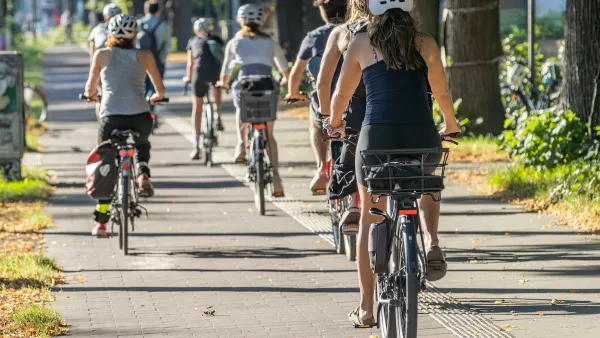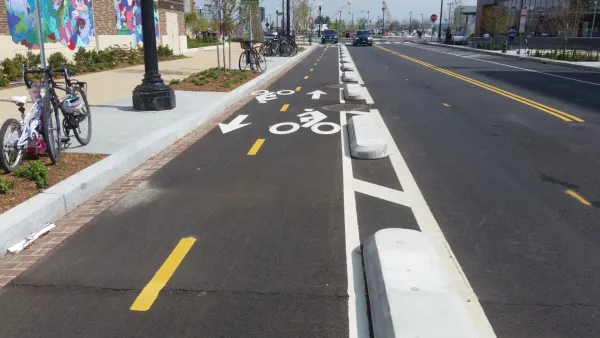With an 18-month pilot program coming to an end, local officials plan to dismantle the city’s only protected bike lane.

Editor's Note: After receiving a donation of $600,000 from the Sherwood Foundation on September 30, the bikeway will remain in place for roughly three years.
Omaha bike advocates are rallying to protest the removal of the city’s only protected bike lane, which the city plans to eliminate after the end of its pilot program despite support for the project from the City Council. As Jessica Wade reports for the Omaha World Herald, the protests were planned after Mayor Jean Stothert announced the decision not to extend the program.
“The city first opened the protected bike lane, known as the Market to Midtown Bikeway, in July 2021. The 2-mile, two-way lane is protected by bollards and set between the curb and parallel parking spaces,” Wade explains. An article by Arjav Rawal and Chris Bowling in The Reader points out that “In August, Bike Walk Nebraska released an evaluation of the bikeway that showed a 69% increase in the usage of bike share programs.”
Bike Walk Nebraska, an organization that lobbied for the bike lane, said it would cut ties with Metro Smart Cities, the advisory board co-chaired by Mayor Stothert that was convened to pilot innovative transit projects in the city.
According to the mayor, the city will evaluate the results of the project to inform future decisions about new bike infrastructure. The mayor also noted that the current Harney Street bike lane raises concerns because of a planned streetcar route that would run alongside the bike lane. Notably, according to the Reader article, “Jay Noddle, the president of the Omaha Streetcar Authority, said he didn’t want the streetcar to replace the Bikeway.”
FULL STORY: Events planned to protest removal of Omaha's protected bike lane

Planetizen Federal Action Tracker
A weekly monitor of how Trump’s orders and actions are impacting planners and planning in America.

Chicago’s Ghost Rails
Just beneath the surface of the modern city lie the remnants of its expansive early 20th-century streetcar system.

San Antonio and Austin are Fusing Into one Massive Megaregion
The region spanning the two central Texas cities is growing fast, posing challenges for local infrastructure and water supplies.

Since Zion's Shuttles Went Electric “The Smog is Gone”
Visitors to Zion National Park can enjoy the canyon via the nation’s first fully electric park shuttle system.

Trump Distributing DOT Safety Funds at 1/10 Rate of Biden
Funds for Safe Streets and other transportation safety and equity programs are being held up by administrative reviews and conflicts with the Trump administration’s priorities.

German Cities Subsidize Taxis for Women Amid Wave of Violence
Free or low-cost taxi rides can help women navigate cities more safely, but critics say the programs don't address the root causes of violence against women.
Urban Design for Planners 1: Software Tools
This six-course series explores essential urban design concepts using open source software and equips planners with the tools they need to participate fully in the urban design process.
Planning for Universal Design
Learn the tools for implementing Universal Design in planning regulations.
planning NEXT
Appalachian Highlands Housing Partners
Mpact (founded as Rail~Volution)
City of Camden Redevelopment Agency
City of Astoria
City of Portland
City of Laramie





























